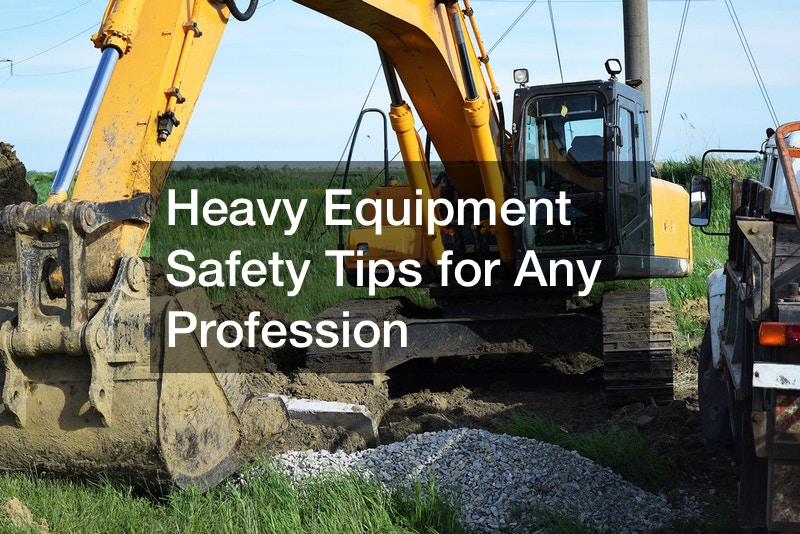
From helping to complete heavy-duty tasks on time to reducing the need for manual labor, heavy equipment is essential in almost every profession. Various types of heavy equipment are at your disposal, including soil stabilizers, bulldozers, generators, and cranes. Using such equipment safely is vital for your safety too. Here are a few tips you’ll want to consider.
Pre-Operation Visual Inspection
An excellent visual inspection provides you with in-depth insights into what to expect from a construction site. As long as it is thorough, it assures you of minimal incidences at the site. This inspection will often rely on raw human senses and non-specialized inspection equipment. Ideally, you will need to report what you see and how safe the environment feels.
A production manager should carry out this visual inspection. This manager understands what problems could arise. This way, it becomes easier for them to identify potential risks and defects, addressing them on time. While they might not remove all occurring defects, they will ensure that the surroundings are significantly safe for workers and passers-by.
This visual inspection could also require you to observe the heavy equipment. You will need to go around the machine, looking for dents and potential damage there. A lap around the device will tell you how reliable the heavy equipment can be. One aspect you should not miss inspecting is the tire pressure. Always consider heavy duty repairs whenever necessary.
You will also need to inspect the cab. This interior will determine the comfort and safety of the operator. As such, ensure that everything is functional and in excellent health. Before running the engine, both the interior and exterior parts of the heavy equipment must be in shape.
Most professionals will recommend that you do a visual inspection daily. Regular assessment allows you to capture some of the things you missed in the previous days. In addition, this move helps avert catastrophes caused by faulty heavy equipment.
Be Aware of Your Environment

Always be mindful of your environment, whether you are operating heavy equipment or within an environment where it is used. Enhanced awareness will help avoid various safety issues, including accidents and fire hazards.
Usually, it would be best to consider the power lines within the environment. These power lines need to be de-energized, making them safer for operators. Suppose it is not possible to de-energize the power lines. In that case, you could create barriers to cushion yourself against hitting them with heavy equipment.
You will also need to pay attention to underground utilities. Whether drain plumbing or electrical systems, ensure that the heavy equipment does not destroy them. Destroying some of these underground utilities could cause fire hazards and various health complications. For instance, destroying sewers and gas lines will cause health issues and fire hazards, respectively.
Various people work or walk around the area of operation. Their safety is critical. In this case, it would be best to be careful with the swing radius, mainly when working in relatively tight spaces. This move will minimize hitting people or structures, avoiding death and property destruction. Let every swing be precise and relatively slow, too, preventing unwanted occurrences in the long run.
At the same time, heavy equipment should operate in specific places. That means you’ll need to mark the area as a danger zone, sensitizing it against workers and other people. Reducing crowding within the region allows better control and avoids accidents or safety issues.
Have the Right Personal Protective Equipment

Personal protective equipment is the protective dress you wear to help minimize exposure to various hazards. Putting on these pieces of clothes will often ensure that you are less susceptible to workplace injuries and accidents. You will need these pieces of equipment when operating or working around heavy equipment.
Heavy machinery operators require various PPEs, from protective eyewear and ear protection to ear protection and gloves. Each of these pieces performs a specific function. For example, protective eyewear will shield your eyes against debris, dirt, and dust. You’ll also be less susceptible to flying objects that could strike your face.
Heavy equipment can be noisy sometimes. For this reason, you must put on ear protection, which guards your ears against the noise caused by the machine. These devices will help reduce the risk of hearing loss. However, you must choose comfortable and secure ear protection equipment, lest you benefit nothing from wearing them.
Gloves and boots will also suffice. These boots must be steel-toed to protect your toes against getting crushed. Besides, safety boots protect you against injuries caused by falling objects, including stones and heavy metals. On the other hand, your gloves will help protect your hands against burns, scratches, and other injuries. All you need is to choose heavy-duty gloves.
Exit and Entry Inspections
You must understand how to enter and exit the heavy equipment carefully and skilfully. Careful entry and exit will help avert significant danger in the long run. Any mishap could expose you to various work-related injuries, fatalities, and disabilities. You can avoid this by being careful with how you enter and exit.
Safety experts recommend maintaining the three-point contact when entering or leaving the machine. Keeping the three points of contact implies that two feet and one hand must be on the equipment when exiting or entering. You could also opt for two hands and one foot when entering or exiting your heavy equipment. This three-point contact forms a triangle of anchor points, boosting your support.
You will also need to distribute your weight evenly when entering or leaving the heavy equipment. Even weight distribution provides you with enhanced stability, protecting yourself from unexpected falls and injuries. At the same time, you must climb on or down the machine while standing still. This move will significantly boost even weight distribution.
Various heavy machinery comes with specific mounting and dismounting equipment. Ensure that you use this equipment when entering and exiting the heavy equipment. The steps, footholds, traction strips, and running boards will help enhance your support. These elements have excellent traction, guaranteeing you the best stability levels in the long run.
Be mindful of the weather. Snowy, rainy, and icy weather conditions are the most dangerous, exposing you to multiple incidences. These weather conditions make the machine slippery, meaning you must be careful when mounting or dismounting. You might need to use shoes with excellent traction at this time.
Lastly, mind your dress when entering or exiting the machinery. Wearing loose clothes will often expose you to various minor accidents. You could attribute this to how easy it would be for the clothes to hold onto an accessory as you climb or dismount from the machine.
Communication is Highly Important

Your safety will significantly depend on the communication lines you embrace. Ensure that you maintain these communication lines, providing information on various elements that could affect your safety in the long run.
Notably, heavy machinery operators have specific lines of communication. Understanding the signs will ensure that you make better and more logical judgments when operating the machine. For instance, you will need to know the specific movements that ask you to back up, turn left, and turn right. These hand signals are standard, meaning you will need to use them to communicate with others.
You might also need spotters when operating this heavy machinery. Spotters will help ensure that you access various spots with significant ease. In most cases, they will have a two-way radio to help communicate with whoever is using heavy equipment. This way, it becomes easier to minimize accidents caused by machines.
You will also rely on spotters to control pedestrians. They will ensure that pedestrians and passers-by are safe. They will also ensure that other vehicles are safe from danger. However, you’ll need to confirm that they, too, wear the right PPE. They must be easily noticeable, meaning reflector jackets could come in handy.
Buffer Zones Work
Construction sites will often expose you to significant danger and safety issues. Unless you take considerable protective measures, you might have to compensate many people for their injuries. One of the best moves would be to create a buffer zone around where you want to work. This way, it will be effortless to separate and control passers-by, avoiding accidents and injuries.
Suppose you carry out a well drilling business. In this case, there will be a lot of trenches, drains, and deep holes around your working environment. You could create a buffer zone to ensure that unauthorized persons do not access the place. This way, accidents become avoidable. The same should happen if you are conducting septic field installs.
A buffer zone aims at keeping vehicles and pedestrians away from heavy equipment. It separates a safe ground from the working site, allowing other people to do their everyday tasks without too much hassle.
At the same time, buffer zones help protect the quality of your output. It ensures very few distractions, guaranteeing you the best concentration levels. You can only encroach the buffer zone when necessary or authorized.
Repair and Maintain Your Heavy Equipment
Excellent machinery maintenance will help improve your safety in the long run. Allow an expert to assess, inspect, and determine the health status of your heavy equipment. This professional will troubleshoot the issues affecting the machinery, including potential ones. This way, it becomes easier to avoid accidents and stalls during a short and long-term project.
Car collision garages come in handy when repairing heavy equipment after an accident. The professionals in these shops will assess the problem and identify the best solution. Sometimes your issue can be as simple as an oil change, or the whole way up to diesel repair. They will restore the machine to its previous healthy state, allowing you to use it on your construction site without a problem.
You could also rely on them for cylinder repairs. Cylinder failure is caused by various aspects, including improper installation, physical damage, and excessive heat. It would be best to seal any leaks on time, which could help avert more significant damage. Such will also be the time to consider getting heavy duty thread protectors, carbon bearing bush, AC repair, and diesel repair. Out of the list just mentioned, it’s super important to understand that for any service, even something as simple as AC repair, you should leave this service to the professionals.
Know When to Use Equipment

Heavy equipment is designed for specific tasks. As such, you must use the machine for its particular duty, preserving its functionality. For example, excavators, cranes, and wheel loaders are all heavy equipment. However, you cannot use a wheel loader in place of a crane. This move will render the used machine almost useless. It could also damage it.
At the same time, heavy equipment has a specific loading capacity. That means you must avoid overloading or overworking the machine. The best way to prevent this would be to pay attention to the lift capacity and the payload standard of the given equipment. You will also need to make sure that the ringing is secure before you use the machine.
There are specific ways to load and unload your machine. Doing it safely should be a priority, reducing the chances of the machine rolling over. Nothing could avert accidents and work-related injuries more than this!
Maintaining proper safety procedures when using heavy equipment can be a nightmare. Yet, this is something that you cannot overlook. Understanding your limits when using the equipment will help avoid various work-related injuries and accidents. You will need to consider the slope, surroundings, and potential hazards when using this machine.
You will also need to know your emotional and physical limits. This move ensures that you do not operate a machine when you are unstable. Knowing your limits will help protect yourself and your co-workers, thanks to minimal incidences of accidents in the long run. As long as you feel mentally, emotionally, or physically tired, it would be best to avoid using the equipment.
In conclusion, your safety is essential when working around or using heavy equipment. Various aspects go into improving such safety levels, including undergoing thorough training. Thankfully, the insights above give you a headstart. All you need is to observe the mentioned solutions, including personalizing them to suit your working environment.



